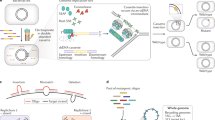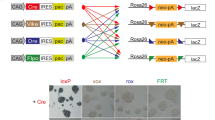
Overview
- Includes cutting-edge methods and protocols.
- Provides step-by-step detail for reproducible results.
- Contains key notes and implementation advice from the experts
Part of the book series: Methods in Molecular Biology (MIMB, volume 1642)
Access this book
Tax calculation will be finalised at checkout
Other ways to access
About this book
This books aims to provide an up-to-date guide to using recombinases in the laboratory. Chapters guide the reader through construction of transgenic animals, recombinase-mediated cassette exchange (RMCE), spatial control of recombinase expression and in vivo delivery approaches, immunohistochemistry and fluorescence-based phenotyping methods, biochemical methods, and recombinase-based production of minimal DNA vectors. Written in the highly successful Methods in Molecular Biology series format, chapters include introductions to their respective topics, lists of the necessary materials and reagents, step-by-step, readily reproducible laboratory protocols, and tips on troubleshooting and avoiding known pitfalls.
Authoritative and cutting-edge, Site-Specific Recombinases: Methods and Protocols aims to serve as a valuable resource for working with recombinases, and inspires further creativity in the field.
Similar content being viewed by others
Keywords
Table of contents (20 protocols)
-
Front Matter
Editors and Affiliations
Bibliographic Information
Book Title: Site-Specific Recombinases
Book Subtitle: Methods and Protocols
Editors: Nikolai Eroshenko
Series Title: Methods in Molecular Biology
DOI: https://doi.org/10.1007/978-1-4939-7169-5
Publisher: Humana New York, NY
eBook Packages: Springer Protocols
Copyright Information: Springer Science+Business Media LLC 2017
Hardcover ISBN: 978-1-4939-7167-1Published: 17 August 2017
Softcover ISBN: 978-1-4939-8405-3Published: 12 May 2018
eBook ISBN: 978-1-4939-7169-5Published: 16 August 2017
Series ISSN: 1064-3745
Series E-ISSN: 1940-6029
Edition Number: 1
Number of Pages: XI, 342
Number of Illustrations: 25 b/w illustrations, 25 illustrations in colour
Topics: Human Genetics



